Sports
/ArcaMax
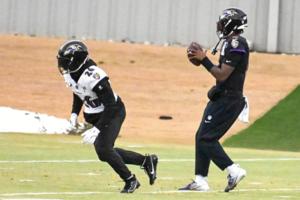
Ravens QB Lamar Jackson returns to practice ahead of Steelers game: 'Very optimistic'
BALTIMORE — Lamar Jackson is back.
The Ravens quarterback returned to practice Wednesday for the first time since suffering a back injury in the second quarter of a Week 16 loss to New England. The two-time NFL Most Valuable Player had been sidelined the past nine days and missed Saturday night’s must-win game against the Green Bay Packers ...Read more
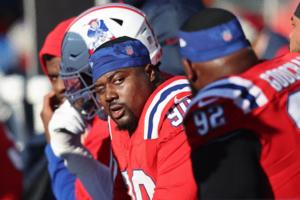
Patriots DL Christian Barmore facing domestic violence charge
Patriots defensive lineman Christian Barmore is facing a misdemeanor charge of assault and battery on a family/household member, according to court documents.
Barmore, 26, has been accused of by his on-again, off-again girlfriend who claims he grabbed her and threw her to the ground during an alleged domestic incident on Aug. 8. He is scheduled...Read more
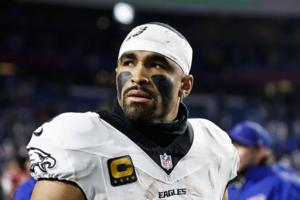
Eagles expected to rest Jalen Hurts and starters on Sunday vs. Commanders
PHILADELPHIA — The Eagles are expected to rest quarterback Jalen Hurts and most of their starters against the Washington Commanders on Sunday, NFL sources said Wednesday.
Eagles coach Nick Sirianni declined to say whether he was resting his starters or not when asked during his Wednesday news conference. He said he wanted to first inform his ...Read more
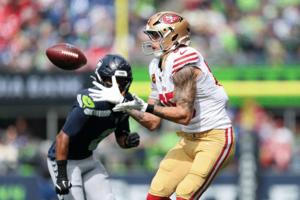
Mike Vorel: Seahawks and 49ers done big disservice by NFL with schedule decision
SEATTLE — For 17 Sundays each regular season on NBC, a highlight package rolls while Carrie Underwood sings:
“The NFL’s best have come to play. Coast to coast, there’s just one thing left to say-ay-ay-ay-ay …”
The Seahawks won’t say it.
So I’ll say it.
This week, the NFL’s best will play on Saturday, a disservice to the ...Read more
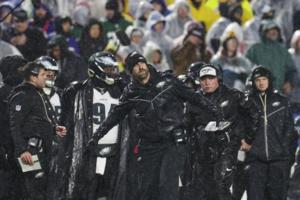
David Murphy: The Eagles wouldn't be foolish to rest their starters in Week 18. But they'd better be right.
PHILADELPHIA — I really don’t know where to begin. Maybe with my Ron Burgundy voice.
"I don’t believe you."
That means you, Nick Sirianni. And you, fellow media members. The big question from Sirianni’s news conference Monday isn’t a question at all. In fact, the Eagles coach is making an obvious error — albeit minor and forgivable...Read more
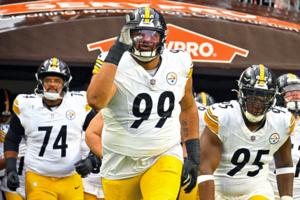
Paul Zeise: Steelers defense only has to be historic for one night
PITTSBURGH — It has been a long, bumpy ride for the Steelers defense this season. It has had as many bad days as good.
This was supposed to be a defense that did historic things, but quite frankly, that never materialized. There were periods when the Steelers couldn't stop rushing offenses and other days when they were shredded through the ...Read more
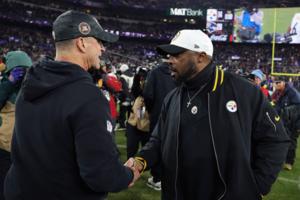
Ravens-Steelers rivalry takes on new chapter with first win-or-go-home game
BALTIMORE — The Ravens-Steelers rivalry got off to a conspicuous start.
Sept. 8, 1996 at 1 p.m. Week 2. Pittsburgh. 75 degrees and partly sunny. Marv Albert and Sam Wyche in the booth for NBC. A Kobe Bryant-Adidas commercial before kickoff. Ten-year veteran Vinny Testaverde under center for nascent Baltimore, which was playing just the second...Read more
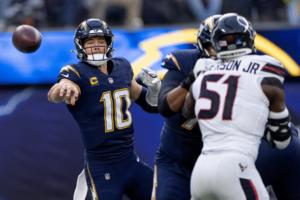
Tom Krasovic: Chargers wise to sit bruised, battered Justin Herbert against Broncos
SAN DIEGO — Earning his next paycheck, Chargers coach Jim Harbaugh said he’ll hold out Justin Herbert and several other starters on Sunday in Denver, a week before the playoffs begin.
The Chargers won’t go far without Herbert carrying them, and no one knows that better than Harbaugh.
A former NFL quarterback, Harbaugh has watched ...Read more
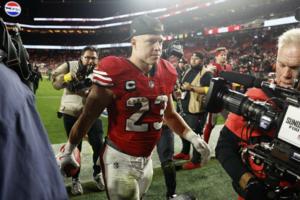
49ers RB Christian McCaffrey battling injury ahead of Saturday showdown with Seattle
SANTA CLARA, Calif. — Christian McCaffrey’s back is aching, understandably so. His 399 touches are the most ever in a 49ers season.
The 49ers’ offensive workhorse has yet to miss a game this season, but a “stiff” back kept him from Tuesday’s light practice at Levi’s Stadium, ahead of Saturday’s high-stakes 5 p.m. kickoff against...Read more
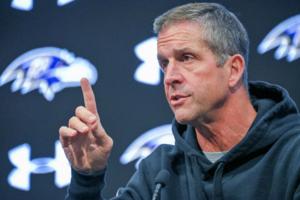
Is Ravens' John Harbaugh coaching for job against Steelers' Mike Tomlin?
BALTIMORE — Mike Tomlin and John Harbaugh are currently the two longest-tenured coaches in the NFL, with 19 and 18 hardened and mostly successful years between them. Yet, as the two men and their respective teams, the Steelers and Ravens, head toward a collision course Sunday night in Pittsburgh, the win-or-go-home nature of the affair could ...Read more
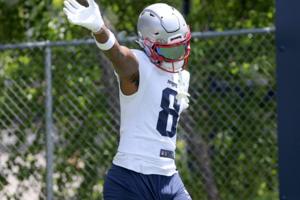
Patriots star WR Stefon Diggs 'categorically denies' allegations in criminal case
Patriots star Stefon Diggs is facing criminal charges in connection with an alleged assault and strangulation that the wide receiver “categorically denies,” according to the organization and multiple published reports.
“The New England Patriots are aware of the accusations that have been made regarding Stefon Diggs,” the organization ...Read more
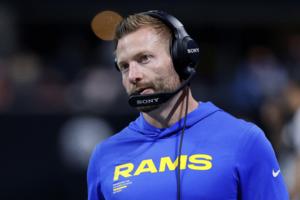
Sam Farmer: What happened to the Rams? Why Sean McVay's team is staggering as rest of NFC heats up.
ATLANTA — The Rams wanted to make the playoffs in the worst way.
Mission accomplished. They’re headed to the playoffs in the worst way imaginable.
Monday night’s 27-24 loss to the Atlanta Falcons was an abomination — you could feel that vibe in the postgame locker room — but the Rams need to study it, even if it requires contraptions...Read more
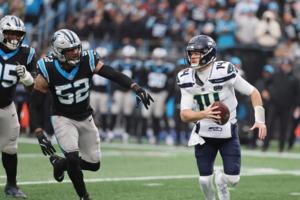
Matt Calkins: Seahawks good enough to win it all with Sam Darnold despite turnovers
SEATTLE — The turnovers, it seems, are going to keep happening. The sample size is large enough where we can draw that conclusion.
With 14 interceptions and six lost fumbles, Seahawks quarterback Sam Darnold has given away the football more times than any other player in the NFL this season. It can be painful to watch — particularly when ...Read more
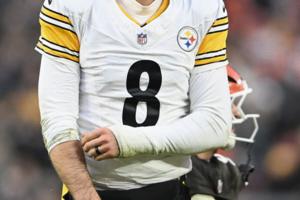
Gerry Dulac: DK Metcalf wasn't the only one who made poor choices that hurt the Steelers
PITTSBURGH — Poor decisions are beginning to plague the Steelers, and they're not limited to what DK Metcalf did in Detroit.
They occurred repeatedly in Sunday's horrid 13-6 loss in Cleveland, a defeat that deprived them the opportunity to win their first AFC North title in five years.
Metcalf's two-game suspension for accosting and striking...Read more
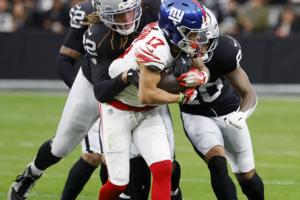
Ed Graney: Minus Maxx Crosby, Raiders look as bad as ever
LAS VEGAS — Raiders coach Pete Carroll wanted to make one thing clear: Maxx Crosby is a warrior. That he wanted to play. That he was heartbroken it didn’t fall that way.
They tried to get by without Crosby, and it, well, didn’t work out. The Raiders continued their journey to the 2026 No. 1 draft pick Sunday by losing to the similarly ...Read more
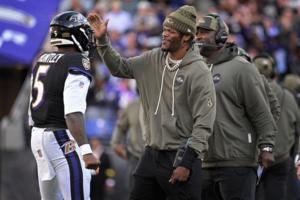
Josh Tolentino: Start Tyler Huntley? Lamar Jackson must finish Ravens' season.
BALTIMORE — Take a bow, Tyler Huntley.
The sixth-year veteran backup quarterback certainly earned it.
With the season in the balance, Huntley stepped into a must-win moment Saturday night and delivered. He played within the structure of the offense and trusted Baltimore’s necessary game plan of leaning on Derrick Henry during the team’s ...Read more
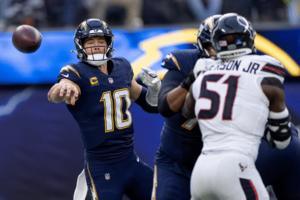
Justin Herbert will not play in Chargers' regular-season finale vs. Broncos
LOS ANGELES — Chargers coach Jim Harbaugh said quarterback Justin Herbert will not play in the team's regular-season finale Sunday against the Denver Broncos.
With the Chargers' 20-16 loss to the Houston Texans on Saturday putting them out of contention for the AFC West title, the move to rest Herbert is a logical one. Herbert is still ...Read more
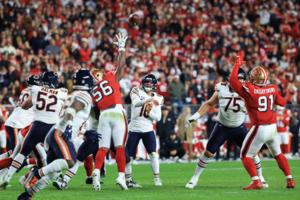
Inside the Bears' 15-play, 58-yard nail-biting final series that came up short: 'We had a shot'
SANTA CLARA, Calif. — The final drive was likely as familiar a feeling to the San Francisco 49ers as it was for the Chicago Bears — even though Sunday night was their first meeting this season.
The Niners had to have seen that script on tape: 2 minutes and 15 seconds to go, the Bears down 4 points, with 85 yards between them and yet another...Read more
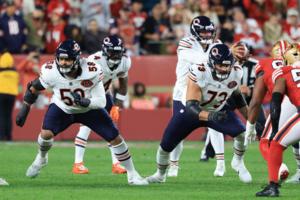
Bears' Darnell Wright took a private plane to Week 17 game after a bug 'did a number on our guys'
SANTA CLARA, Calif. — Chicago Bears right tackle Darnell Wright started to feel under the weather on Friday.
A bug had been going around the team headquarters in Lake Forest, Ill. A number of players showed up on the injury report with illnesses as the Bears prepared to play the San Francisco 49ers on Sunday.
The Bears did everything they ...Read more
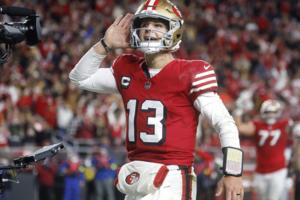
Dieter Kurtenbach: These unbelievable 49ers might just be a team of destiny
Check the math.
The numbers don’t lie, even if NFL general managers occasionally do.
The 49ers are currently carrying more than $110 million in dead money on their books. That’s salary cap space allocated to players who are currently doing anything but playing for San Francisco this season.
In the NFL, $110 million in dead weight isn’t ...Read more
Popular Stories
- David Murphy: The Eagles wouldn't be foolish to rest their starters in Week 18. But they'd better be right.
- Tom Krasovic: Chargers wise to sit bruised, battered Justin Herbert against Broncos
- Ravens-Steelers rivalry takes on new chapter with first win-or-go-home game
- Mike Vorel: Seahawks and 49ers done big disservice by NFL with schedule decision
- Paul Zeise: Steelers defense only has to be historic for one night





